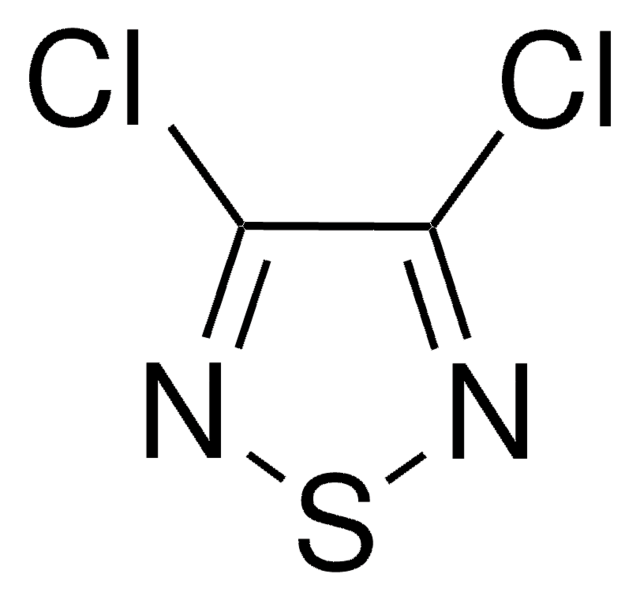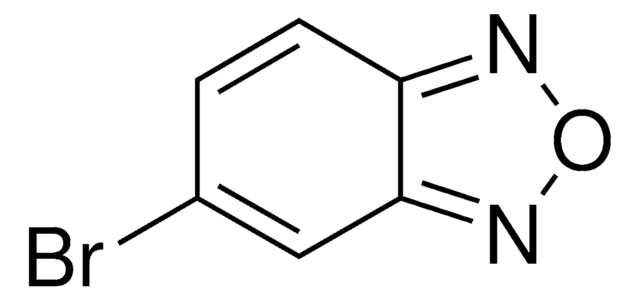All Photos(1)
About This Item
Empirical Formula (Hill Notation):
C6H4N2O
CAS Number:
Molecular Weight:
120.11
MDL number:
UNSPSC Code:
12352100
PubChem Substance ID:
NACRES:
NA.22
Recommended Products
Quality Level
Assay
97%
form
solid
bp
75-85 °C/20 mmHg (lit.)
mp
47-51 °C (lit.)
SMILES string
c1ccc2nonc2c1
InChI
1S/C6H4N2O/c1-2-4-6-5(3-1)7-9-8-6/h1-4H
InChI key
AWBOSXFRPFZLOP-UHFFFAOYSA-N
Signal Word
Warning
Hazard Statements
Hazard Classifications
Acute Tox. 4 Oral
Storage Class Code
11 - Combustible Solids
WGK
WGK 3
Flash Point(F)
168.8 °F - closed cup
Flash Point(C)
76 °C - closed cup
Personal Protective Equipment
dust mask type N95 (US), Eyeshields, Gloves
Choose from one of the most recent versions:
Already Own This Product?
Find documentation for the products that you have recently purchased in the Document Library.
Maki Onoda et al.
Chemical communications (Cambridge, England), (14)(14), 1848-1850 (2005-03-30)
Strong fluorescence signals were observed after the reaction of novel reagents with hydroperoxides.
Tomofumi Santa et al.
Biomedical chromatography : BMC, 23(4), 443-446 (2008-11-19)
Benzofurazan derivatization reagents, 4-[2-(N,N-dimethylamino)ethylaminosulfonyl]-7-(2-aminopentylamino)-2,1,3-benzoxadiazole (DAABD-AP) and 4-[2-(N,N-dimethylamino) ethylaminosulfonyl]-7-(2-aminobutylamino)-2,1,3-benzoxadiazole (DAABD-AB), for short-chain carboxylic acids in liquid chromatography/electrospray ionization tandem mass spectrometry (LC/ESI-MS/MS) were synthesized. These reagents reacted with short chain carboxylic acids in the presence of the condensation reagents at 60
Seiichi Uchiyama et al.
Analytical chemistry, 76(6), 1793-1798 (2004-03-17)
Fluorescent molecular thermometers based on polymers showing a temperature-induced phase transition and labeled with polarity-sensitive fluorescent benzofurazans are the most sensitive known. Here we show a simple and effective method for modulating the sensitive temperature ranges of fluorescent molecular thermometers
Alex Brown et al.
The journal of physical chemistry. A, 116(1), 46-54 (2011-12-06)
General chemical strategies which provide controlled changes in the emission or absorption properties of biologically compatible fluorophores remain elusive. One strategy employed is the conversion of a fluorophore-attached alkyne (or azide) to a triazole through a copper-catalyzed azide-alkyne coupling (CuAAC)
Yinghong Li et al.
Analytical chemistry, 84(15), 6877-6883 (2012-07-17)
Thiol groups play a significant role in various cellular functions. Cellular thiol concentrations can be affected by various physiological or pathological factors. A fluorescence imaging agent that can effectively and specifically image thiols in live cells through fluorescence microscopy is
Our team of scientists has experience in all areas of research including Life Science, Material Science, Chemical Synthesis, Chromatography, Analytical and many others.
Contact Technical Service

![Benzo[c][1,2,5]oxadiazole-5-boronic acid pinacol ester 97%](/deepweb/assets/sigmaaldrich/product/structures/143/941/5b091bed-2dcd-4ac5-b86d-70df392aabce/640/5b091bed-2dcd-4ac5-b86d-70df392aabce.png)






